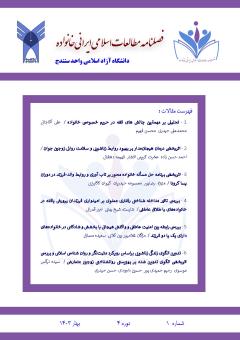اثربخشی برنامه حل مسأله خانواده محور بر تاب آوری و روابط والد-فرزند در دوران پسا کرونا
محورهای موضوعی : مطالعات اسلامی ایرانی خانواده
منیژه رضاپور
1
,
معصومه حیدریان
2
*
![]() ,
کیوان کاکابرایی
3
,
کیوان کاکابرایی
3
1 - دانشجوی دکترا دانشگاه آزاد سنندج
2 - استادیار، گروه روانشناسی بالینی، واحد کرمانشاه، دانشگاه آزاد اسلامی، کرمانشاه، ایران
3 - گروه روانشناسی، دانشگاه ازاد اسلامی واحد کرمانشاه
کلید واژه: برنامه حل مسأله خانواده محور, تابآوری, روابط والد-فرزند, دوران پسا کرونا.,
چکیده مقاله :
مقدمه: پژوهش حاضر با هدف بررسی اثربخشی برنامه حل مسئله خانواده محور بر تاب آوری و روابط والد-فرزند در دوران پسا کرونا انجام گرفت. روش: این پژوهش از نظر هدف کاربردی و به لحاظ روش اجرا کمی، نیمه آزمایشی (پیش آزمون-پس آزمون و پیگیری) با گروه کنترل می باشد. جامعه آماری این پژوهش شامل کلیه کارمندان متاهل 3 دانشکده فنی حرفهای دختران 1، پسران 1 و 2 شهرستان کرمانشاه بود. حجم نمونه 200 نفر به روش تصادفی در گروه آزمایش و گروه کنترل انتخاب شدند. ابزارهای پژوهش شامل پرسشنامه تاب آوری و ارتباط والد-فرزند بود. برای تجزیه و تحلیل دادههای پژوهش از آمار توصیفی و استنباطی استفاده شد. یافته ها: نتایج نشان داد برنامه حل مساله خانواده محور بر تاب آوری و روابط والد- فرزند تاثیر دارد. نتیجه گیری: نتایج اثربخشی نشان داد برنامه حل مسئله خانواده محور بر کیفیت روابط والد –فرزند و افزایش تابآوری تأثیر دارد. بنابراین برنامه حل مسئله خانواده محور بر تابآوری و روابط والد-فرزند در دوران پسا کرونا در یک پیگیری دو ماهه مؤثر است.
Introduction: the present study aimed to examine the effectiveness of the family-based problem solving program on parent-child resilience and relationships in the post-coronavirus era. Method: this research is semi-experimental (pre-test-post-test and follow-up) with the control group in terms of practical purpose and in terms of quantitative, semi-experimental (pre-test-post-test and follow-up) implementation method. The statistical community of this study included all married employees of 3 Vocational Technical Schools for Girls 1, boys 1 and 2 in Kermanshah. Sample size 200 people were randomly selected in the test group and control group. Research tools included a resilience questionnaire and parent-child communication. Descriptive and inferential statistics were used to analyze the research data. Findings: the results showed that the family-oriented problem solving program affects parent - child resilience and relationships. Conclusion: the results of the effectiveness showed that the family-oriented problem solving program affects the quality of parent –child relationships and increases resilience. So the family-oriented problem-solving program focuses on resilience and parent-child relationships in the post-coronavirus in a two-month follow-up.

